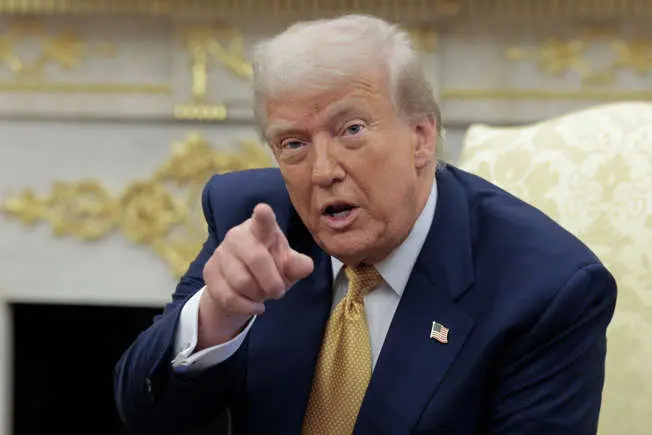
Trump targets countries taxing U.S. tech giants with tariffs and restrictions, sparking global debate over digital sovereignty
A New Front in the Trade War
U.S. President Donald Trump has launched a fresh wave of trade threats but this time, the target isn’t China. Instead, he’s focusing on countries that tax American tech giants like Google, Apple, Amazon, and Meta. From France to the UK, governments have introduced Digital Services Taxes (DSTs) to make Big Tech pay for the profits they earn from local users.
Trump responded with a fiery post on social media, warning that nations imposing DSTs would face “substantial additional tariffs” and export restrictions on U.S. technology and chips. He called these taxes “discriminatory”, arguing that they unfairly target American companies while giving Chinese tech firms a free pass.
This marks a major shift in global trade tensions. While earlier battles focused on manufacturing and goods, this new conflict is about digital sovereignty—who controls the rules of the internet, and who gets to profit from it.
Digital Taxes – What Are Digital Services Taxes DST?
Digital Services Taxes are special levies placed on online advertising, marketplace commissions, and user data sales. They are not corporate income taxes, but gross-revenue taxes based on how much money tech companies make from users in a specific country.
Here’s how some countries apply DSTs:
- France: 3% tax on digital ads and data sales for companies earning over €750 million globally and €25 million in France.
- UK: 2% tax on search engines, social media, and marketplaces with over £500 million global revenue and £25 million from UK users.
- Italy, Spain, Austria, Turkiye: Similar taxes ranging from 3% to 7.5%, mostly targeting large U.S.-based platforms.
Governments say these taxes are fair because tech giants earn billions from local users but pay little or no tax in those countries. The DSTs aim to close loopholes and ensure that companies contribute to the economies they profit from.
However, the U.S. government sees it differently. Trump’s administration argues that DSTs are designed to punish American firms, and has revived trade investigations under Section 301 of U.S. trade law.
Tariffs, Tech Restrictions, and Global Tensions
Trump’s warning isn’t just talk. He has already signed Executive Order 14329, authorizing new tariffs on imports from countries with DSTs. For example, India now faces a 50% tariff on certain goods, effective August 27.
The U.S. is also threatening to restrict exports of advanced technology, including semiconductors and software from companies like Nvidia and Qualcomm. These components are critical for AI, 5G, and other tech industries. Countries like Germany and the UK, which rely on U.S. chips, could face serious disruptions.
Meanwhile, the European Union has defended its digital tax laws, saying they are neutral and democratic. EU officials argue that the Digital Services Act (DSA) and Digital Markets Act (DMA) apply to all companies, regardless of nationality.
But Trump isn’t convinced. He claims the EU’s rules are “Orwellian” and designed to censor and control U.S. platforms. The U.S. is even considering visa restrictions on EU officials involved in enforcing these laws.
Who Controls the Internet?
At the heart of this conflict is a bigger question: Who gets to write the rules of the internet? Is it national governments, global corporations, or powerful countries like the United States?
Countries imposing DSTs say they are protecting their digital sovereignty, the right to regulate online activity within their borders. They argue that tech companies should follow local laws and pay taxes where they earn revenue.
Tech giants, on the other hand, prefer global standards that allow them to operate freely across borders. Many support efforts by the OECD to create a unified tax framework, but progress has been slow.
Trump’s approach is different. He sees DSTs as an attack on American innovation and is using tariffs and trade pressure to fight back. His message is clear: “Show respect to America and our amazing Tech Companies or, consider the consequences.”
Final Thoughts
Trump’s new trade war over digital taxes is more than a fight over money, it’s a battle over power, fairness, and control in the digital age. As countries push for fair taxation and tech giants defend their profits, the world is watching to see who will shape the future of the internet.
Will it be governments, corporations, or Washington? The answer may define the next decade of global tech and trade.
Also read – Tariff Tug-of-War: How Trump’s Bold Trade Gambit Could Supercharge BRICS and Undermine U.S. Leverage
Sri Lanka Caught in the Crossfire: Trump’s Trade War with India Hits Parliament
Shocking China-US Trade War Escalates: Trump’s Tariff Blitz Sparks Global Economic Turmoil
Stay informed with the latest news and updates – only on Rapido Updates.